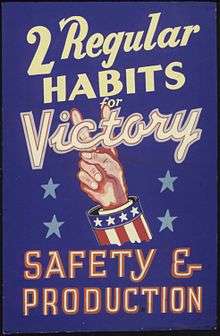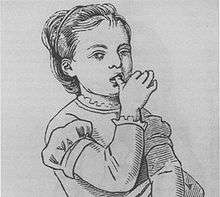
Each year one vicious habit rooted out,
In time might make the worst Man good throughout.
~ Benjamin Franklin
In time might make the worst Man good throughout.
~ Benjamin Franklin
Habits are automatic routines of behavior that are repeated regularly, without thinking. They are learned, not instinctive, human behaviors that occur automatically, without the explicit contemporaneous intention of the person. The person may not be paying attention to or be conscious or aware of the behavior. When the behavior is brought to the person's attention, they may be able to control it.
Quotes


To uproot an old habit is sometimes a more painful thing, and vastly more difficult, than to wrench out a tooth. ~ Samuel Smiles
- Not for nothing is habit called a second and a kind of manufactured nature.
- Augustine of Hippo, On Music (AD 389), Bk VI, ch 19.
- Habit is a compromise effected between an individual and his environment.
- Samuel Beckett (1906–1989), Irish dramatist and novelist. Proust, Grove Press edition (1957), p. 7.
- HABIT, n. A shackle for the free.
- Ambrose Bierce, The Cynic's Dictionary (1906); republished as The Devil's Dictionary (1911).
- Monks, these two extremes ought not to be practiced by one who has gone forth from the household life. (What are the two?) There is addiction to indulgence of sense-pleasures, which is low, coarse, the way of ordinary people, unworthy, and unprofitable; and there is addiction to self-mortification, which is painful, unworthy, and unprofitable. Avoiding both these extremes, the Tathagata (the Perfect One) has realized the Middle Path; it gives vision, gives knowledge, and leads to calm, to insight, to enlightenment and to Nibbana. And what is that Middle Path realized by the Tathagata...? It is the Noble Eightfold path, and nothing else, namely: right understanding, right thought, right speech, right action, right livelihood, right effort, right mindfulness and right concentration.
- Whereas some ascetics and Brahmins remain addicted to such unedifying conversation as about kings, robbers, ministers, armies, dangers, wars, food, drink, clothes, beds, garlands, perfumes, relatives, carriages, villages, towns and cities, countries, women, heroes, street- and well-gossip, talk of the departed, desultory chat, speculations about land and sea, talk about being and non-being, the ascetic Gotama refrains from such conversation.
- Gautama Buddha M. Walshe, trans. (1987), Sutta 1 (Brahmajala Sutta (Theravada)), verse 1.17, p. 70.
- If use becomes abuse, we should intervene at once, for if abuse becomes habit, then there is no remedy.
- Fausto Cercignani in: Brian Morris, Quotes we cherish. Quotations from Fausto Cercignani, 2014, p. 35.
- Each year one vicious habit rooted out, In time might make the worst Man good throughout.
- Benjamin Franklin, Poor Richard's Almanack (1738).
- The Tabernanthe iboga plant grows in the rainforests of Gabon. It’s a leafy green shrub with fruits that look not unlike fat, orange jalapeño peppers, but it’s the bark of the root from which you extract ibogaine. For centuries it has been used to induce visions in participants in the bwiti ceremony, a traditional, days-long tribal coming-of-age ritual where hallucinogenic visions are understood as a death and rebirth. They believe that iboga enables them to commune with their ancestors (bwiti is roughly translated as ancestor).
According to the Global Ibogaine Therapy Alliance, which publishes research and information on ibogaine, this ancestor worship by Gabonese tribes holds that by learning the language of the spirits of things it is possible to communicate with God.
In the mid-1800s researchers brought a specimen back to France and, 60 years on, ibogaine was being marketed there under the name Lambarène for use as a stimulant. In 1985 a man called Howard Lotsof was awarded the first US patent for its use in treating opioid addiction – two decades earlier Lotsof had himself been an addict when he’d first tried ibogaine. “The next thing I knew,” he told the New York Times in 1994, “I was straight.” But it remained banned in the US even as, by the late 1990s, it was being touted on the nascent internet as a miracle drug for opioid addicts.- Alex Hannaford, “Dying to get clean: is ibogaine the answer to heroin addiction?“, The Guardian, (10 Dec 2017).
- [Y]ou get used to everything. No human force, not even fear, is stronger than habit.
- Renowned addiction expert Gabor Mate believes that addiction is a direct result of the coping mechanisms developed in early childhood to deal with stress, abuse, or trauma (Mate is a member of the Psychotherapist/Trauma camp defined in my book, The Abstinence Myth). He believes in the power of Ayahuasca as a treatment to the underlying psychological distress experienced by people facing addiction.
"No matter what a person is addicted to—whether it’s eating, shopping, sex, drugs—each addicted person harbors a deep pain, which they may or may not be in touch with. The plant removes the self-created barriers to get in touch with the source of that pain, so you realize what you’ve been running from all of your life.”- Adi Jaffe, “Ayahuasca for Addiction? That's a Trip”, Psychology Today, (Dec 10, 2018).
- Addictions come from shortages in infancy. People try to compensate this way. Alcoholism is generally produced from a shortage in mother's milk. And heroin addiction is usually due to a lack of being, the absence of recognition; the drug fills the emptiness of not being loved.
- Alejandro Jodorowsky Psychomagic: The Transformative Power of Shamanic Psychotherapy (2010)
- Every habit makes our hand more witty and our wit less handy.
- Friedrich Nietzsche (1844–1900), German philosopher and critic. The Gay Science (1882), Third Book, 'Habit', aphorism 247.
- How use doth breed a habit in a man!
This shadowy desert, unfrequented woods,
I better brook than flourishing peopled towns.- William Shakespeare, The Two Gentlemen of Verona (1590s), Act V, scene 4, line 1.
- To uproot an old habit is sometimes a more painful thing, and vastly more difficult, than to wrench out a tooth.
- Samuel Smiles, 19th C Scottish author and reformer. 'Character: The True Gentleman', Self-Help (1856), Ch 13.
- Since this is the age of science, not religion, psychiatrists are our rabbis, heroin is our pork, and the addict is the unclean person.
- Thomas Szasz, The Second Sin (New York: 1973), p. 64
- If it weren't for alcohol, tranquilizers, antidepressants, as well as the illegal drugs, which are all consumed in vast quantities, the insanity of the human mind would become even more glaringly obvious than it is already. I believe that, if deprived of their drugs, a large part of the population would become a danger to themselves and others. These drugs, of course, simply keep you stuck in dysfunction. Their widespread use only delays the breakdown of the old mind structures and the emergence of higher consciousness. While individual users may get some relief from the daily torture inflicted on them by their minds, they are prevented from generating enough conscious presence to rise above thought and so find true liberation. p.67
- Eckhart Tolle in The Power of Now: A Guide to Spiritual Enlightenment (1997) p.67
- If you have a compulsive behavior pattern such as smoking, overeating, drinking, TV watching, Internet addiction, or whatever it may be, this is what you can do: When you notice the compulsive need arising in you, stop and take three conscious breaths. This generates awareness. Then for a few minutes be aware of the compulsive urge itself as an energy field inside you. Consciously feel that need to physically or mentally ingest or consume a certain substance or the desire to act out some form of compulsive behavior. Then take a few more conscious breaths. After that you may find that the compulsive urge has disappeared for the time being or you may find that it still overpowers you, and you cannot help but indulge or act it out again. Don't make it into a problem. Make the addiction part of your awareness practice in the way described above. As awareness grows, addictive patterns will weaken and eventually dissolve. Remember, however, to catch any thoughts that justify the addictive behavior, sometimes with clever arguments, as they arise in you mind. Ask yourself, Who is talking here? And you will realize the addiction is talking. As long as you know that, as long as you are present as the observer of your mind, it is less likely to trick you into doing what it wants.
- Eckhart Tolle in A New Earth: Awakening to Your Life's Purpose, (2005)
Hoyt's New Cyclopedia Of Practical Quotations
- Quotes reported in Hoyt's New Cyclopedia Of Practical Quotations (1922), p. 436-47.
- A civil habit
Oft covers a good man.- Beaumont and Fletcher, Beggar's Bush, Act II, scene 3, line 210.
- Consuetude quasi altera natura effici.
- Habit is, as it were, a second nature.
- Cicero, De Finibus Bonorum et Malorum, V, 25, Tusculanarum Disputationum, II, 17.
- Habit with him was all the test of truth;
"It must be right: I've done it from my youth."- George Crabbe, The Borough (1810), Letter III.
- We sow our thoughts, and we reap our actions; we sow our actions, and we reap our habits; we sow our habits, and we reap our characters; we sow our characters, and we reap our destiny.
- C. A. Hall.
- Clavus clavo pellitur, consuetudo consuetudine vincitur.
- A nail is driven out by another nail, habit is overcome by habit.
- Erasmus, Diluculum.
- A man used to vicissitudes is not easily dejected.
- Samuel Johnson, Rasselas, Chapter XII.
- Habits form character and character is destiny.
- Joseph Kaines, address (Oct. 21, 1883); Our Daily Faults and Failings.
- Consuetudo consuetudine vincitur.
- Habit is overcome by habit.
- Thomas à Kempis, Book I, 21.
- Small habits, well pursued betimes,
May reach the dignity of crimes.- Hannah More, Florio, Part I.
- Sow an action, reap a habit.
- David Christy Murray, Samuel Smiles, George Dana Boardman, Ralph Waldo Emerson, William Makepeace Thackeray, Charles Reade, William James
- Nil consuetudine majus.
- Nothing is stronger than habit.
- Ovid, Ars Amatoria, II, 345.
- Abeunt studia in mores.
- Pursuits become habits.
- Ovid, Heroides, XV, 83.
- Morem fecerat usus.
- Habit had made the custom.
- Ovid, Metamorphoses, II. 345.
- Ill habits gather by unseen degrees,
As brooks make rivers, rivers run to seas.- Ovid, Metamorphoses, Book XV, line 155. Dryden's translation.
- Frangas enim citius quam corrigas quæ in pravum induerunt.
- Where evil habits are once settled, they are more easily broken than mended.
- Quintilian, De Institutione Oratoria, I, 3, 3.
- Sow an act and you reap a habit. Sow a habit and you reap a character. Sow a character and you reap a destiny.
- Consuetudo natura potentior est.
- Habit is stronger than nature.
- Quintus Curtius Rufus, De Rebus Gestis Alexandri Magni, V, 5, 21.
- Vulpem pilum mutare, non mores.
- The fox changes his skin but not his habits.
- Suetonius, Vespasianus, 16.
- Inepta hæc esse, nos quæ facimus sentio;
Verum quid facias? ut homo est, ita morem geras.- I perceive that the things that we do are silly; but what can one do? According to men's habits and dispositions, so one must yield to them.
- Terence, Adelphi, III, 3, 76.
- Quam multa injusta ac prava fiunt moribus!
- How many unjust and wicked things are done from mere habit.
- Terence, Heauton timoroumenos, IV, 7, 11.
- In ways and thoughts of weakness and of wrong,
Threads turn to cords, and cords to cables strong.- Isaac Williams, The Baptistry, Image 18.
Dictionary of Burning Words of Brilliant Writers (1895)
Quotes reported in Josiah Hotchkiss Gilbert, Dictionary of Burning Words of Brilliant Writers (1895).
- Habit if not resisted soon becomes necessity.
- Augustine of Hippo, p. 296.
- Give a child the habit of sacredly regarding the truth—of carefully respecting the property of others — of scrupulously abstaining from all acts of improvidence which can involve him in distress, and he will just as likely think of rushing into the element in which he cannot breathe, as of lying or cheating or stealing.
- Henry Brougham, 1st Baron Brougham and Vaux]], p. 295.
- Centres, or centre-pieces of wood, are put by builders under an arch of stone while it is in the process of construction till the key-stone is put in. Just such is the use Satan makes of pleasures to construct evil habits upon; the pleasure lasts till the habit is fully formed; but that done, the habit may stand eternal. The pleasures are sent for firewood, and the hell begins in this life.
- Samuel Taylor Coleridge, 1st Baron Brougham and Vaux, p. 295.
- Infinite toil would not enable you to sweep away a mist, but by ascending a little you may often look over it altogether. So it is with our moral improvement; we wrestle fiercely with a vicious habit, which could have no hold upon us if we ascended to a higher atmosphere.
- Sir Arthur Helps, 1st Baron Brougham and Vaux]], p. 296.
- The diminutive chains of habit are seldom heavy enough to be felt, till they are too strong to be broken.
- Samuel Johnson, p. 296.
- A large part of Christian virtue consists in right habits.
- William Paley, p. 295.
- Every sinful act is another cord woven into that mighty cable of habit, which binds the spirit to the throne of darkness.
- David Thomas, p. 296.
External links
This article is issued from
Wikiquote.
The text is licensed under Creative
Commons - Attribution - Sharealike.
Additional terms may apply for the media files.